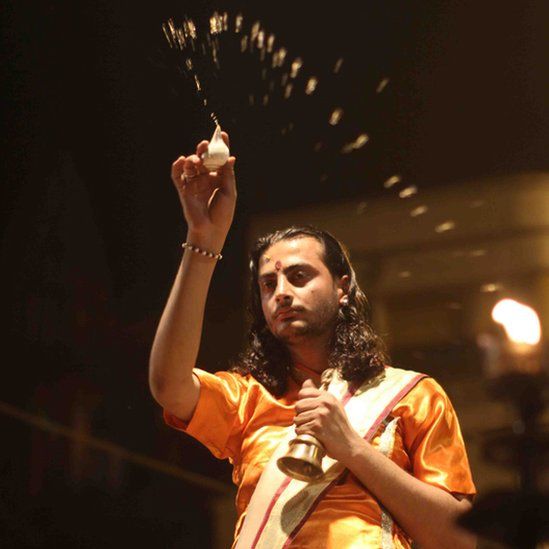Invented tradition and the religion of the ancients
- Published

There's much we know about the world's biggest election, currently in full swing in India - some 800 million voters, voting in nine separate stages over five weeks, before results on 16 May. But in India, there are always surprises, as the BBC's Owen Bennett Jones has been reminded on the campaign trail.
Varanasi - it was the obvious place to go for all sorts of reasons.
It was hosting a high-profile clash between the man who would be prime minister, Narendra Modi, and Arvind Kejriwal, the leader of a new party committed to fighting corruption.
You could tell it was a high-profile electoral battleground from the fact that whenever he appeared in public, Mr Kejriwal had eggs and ink thrown at him.
It is also known as India's holiest city, a place that exudes exactly the kind of Hindu cultural identity that Modi says he wants to protect.
And just to shake it all up a bit, there was a transgender candidate standing too.
All very promising.
Within an hour of reaching Varanasi it was all going very much according to plan.
With surprising speed I ended up, with a couple of other journalists and a local businessman, on a boat being rowed down the Ganges towards a Hindu ceremony.
There in the fading evening light six priests standing on plinths on the riverbank were surrounded by thousands of people sitting on ancient stone steps that led down to the water.
The priests - some with long hair tied back - were dressed in white robes from head to toe.
They started by blowing into some conch shells, creating a low timeless sound and then came the bells and the incense swirling through the air. As the rhythmic chanting lulled the spectators into a state of spiritual relaxation, attendants produced lamps, each one with a thousand candles.
On the Ganges itself some candles in small bowls were launched on the calm, wide waters - they floated into distance, diminishing specks of light.
"I am surprised I have never seen these images on TV," I remarked to another journalist on the boat.
"Oh! There are festivals all over India. They are happening all the time," he replied.
Back on the riverbank the priests had started whirling some sort of ancient-looking contraptions in the air.
The bell ringing was more intense now, boys pulling on strings that made a whole row of bells high in the air, chime in time with the chanting.
And then to my side there appeared a convoy of wooden boats - a long procession meandering up the Ganges.
All eyes turned to them and on board there were children dressed as gods, their smiling, proud faces frames in swirls of gold and red braid.
If ever there were a physical manifestation of the romanticisation of the East which Westerners are so often accused of then here it was before my eyes.
"You can see how Orientalism got under way," I thought. "It probably started right here."
I wrote it all up. The festival provided exactly the sort of colour I need to brighten up what might otherwise have been a rather dry report on the politics of the constituency. I sent it off to London.
My editor - a man who knows India well having lived there for many years - sent me an email.
"A touch of the 'Bharat darshan'," he chided gently, "look it up."
I did.
"Religion of the ancients," Google said.
I wondered what he meant. That it was all a bit ritualistic perhaps in the context of modern India. A throwback rather than a look ahead.
A couple of days later I was sitting in the BBC studio in Delhi with a young Indian journalist who had come in to comment on the election campaign. He heard my report in his headphones.
"You were in Varanasi?" he asked.
"Yes."
"And you recorded something at the ceremony they have on the riverbank there."
"That's right."
"In a boat?"
"Yes. It was wonderful."
"You know the whole thing was invented by the manager of a luxury hotel in Varanasi about 20 years ago. He was trying to drum up the number of tourists coming to town."
"I see. Right."
Journalists get lied to so often that they generally end up fairly cynical, or perhaps to put it more kindly, sceptical. And let me say straight away that I am not accepting the journalist's account without question.
Even if I went back to Varanasi and investigated the matter I have no doubt that some people would insist the ceremony has been going on for centuries.
That's the way with these things. But still it was a bit of a shocker. Perhaps you can never quite go far enough in questioning why things are happening - what purpose they really serve.
I emailed my boss.
"About that ceremony," I said. "You might well have been right."
I told him what the journalist in the studio had said.
"Ah yes," he replied. "The invention of tradition. Happens everywhere."
How to listen to From Our Own Correspondent:
BBC Radio 4: Saturdays at 11:30 and some Thursdays at 11:00
BBC World Service: Short editions Monday-Friday - see World Service programme schedule.
Follow @BBCNewsMagazine on Twitter and on Facebook
- Published12 April 2014
- Published14 April 2014